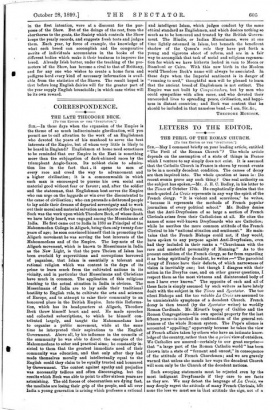CORRESPONDENCE.
THE LATE THEODORE BECK.
[TO TIIE EDITOR OF TEE "SPECTATOR."]
SIR,—In these days when the expansion of the Empire is the theme of so much indiscriminate glorification, will you permit me to call attention to the work of an Englishman who devoted the years of his manhood to serve the best interests of the Empire, but of whom very little is likely to be heard in England ? Englishmen at home need sometimes to be reminded that our Empire in the East is something more than the subjugation of dark-skinned races by the triumphant Anglo-Saxon. Its noblest claim to admira- tion lies in the fact that . it opens to men of every race and creed the way to advancement and a higher civilisation; it is a commonwealth in which each man is encouraged to pursue his own social and material good without fear or favour; and, after the soldier and the statesman, that Englishman best serves the Empire who can urge on the laggards or win over the discontented to the cause of civilisation; who can persuade a dethroned people to lay aside their dreams of departed sovereignty and to work out their moral and material salvation as subjects of the Queen. Such was the work upon which Theodore Beck, of whose death we have lately heard, was engaged among the Mussulmans of India. He first came out to India in 1883 as Principal of the Mahommedan College in Aligarh, being then only twenty-four years of age; he soon convinced himself that in promoting the Aligarh movement he was serving the best interests of the Mahommedans and of the Empire. The key-note of the Aligarh movement, which is known to Mussulmans in India as the New Light, is that the pure Theism of Islam has been overlaid by superstitions and corruptions borrowed of paganism, that Islam is essentially a tolerant and rational religion which was content in the days of its prime to learn much from the cultivated nations in its vicinity, and in particular that Mussulmans and Christians have much in common. The application of this religious teaching to the actual situation in India is obvious. The Mussulmans of India are to lay aside their traditional hostility to English rule, to cultivate the arts and sciences of Europe, and to attempt to raise their community to an honoured place in the British Empire. Into this Reforma- tion, which has its headquarters at Aligarh, Theodore Beck threw himself heart and soul. He made speeches and collected subscriptions, to which be himself con- tributed largely, and taught the Mahommedans how to organise a public movement, while at the same time he interpreted their aspirations to the English Government. Above all, by his influence in the councils of the community he was able to direct the energies of the Mahommedans to sober and practical aims; he constantly in- sisted to them that the greatest immediate need of their community was education, and that only after they had made themselves morally and intellectually equal to the English could they claim to be equally trusted and honoured by Government. The contest against apathy and prejudice was necessarily tedious and often discouraging, but the results which Beck was able to point to after sixteen years are astonishing. The old forces of obscurantism are dying fast, the moollahs are losing their grip of the people, and all over India a young generation is arising which professes a rational and intelligent Islam, which judges conduct by the same ethical standard as Englishmen, and which desires nothing so much as to be honoured and trusted by the British Govern- ment. The Hindle, or Indian Mussulmans, were at one time lightly esteemed in Islam, but beneath the beneficent shadow of the Queen's rule they have put forth a young and vigorous shoot of reform, and are in a fair way to accomplish that task of social and religious regenera- tion for which we have hitherto looked in vain to Mecca or Stamboul or Cairo. With this new birth in the Moslem world Theodore Beck's name will always be associated. In these days when the Imperial sentiment is in danger of "running to seed," thoughtful men will be pleased to learn that the ancient breed of Englishmen is not extinct. The Empire was not built by Conquistadors, but by men who could sympathise with alien races, and who devoted their unrecorded lives to spreading peace, civilisation, and happi- ness in distant countries ; and Beck was content that he should be included in that nameless band.—I am, Sir, &c.,
THEODORE MORISON.






































 Previous page
Previous page